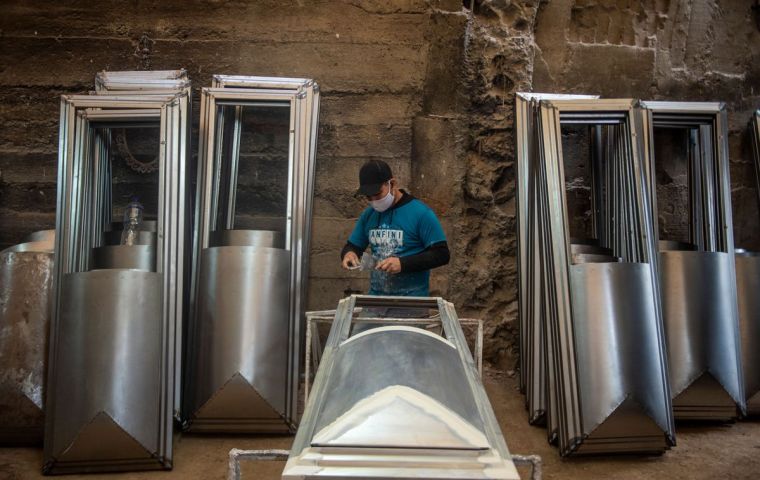MercoPress. South Atlantic News Agency
The flourishing business of coffin making in Peru… with Venezuelan labor
 Peru is the second worst-hit Latin American country after Brazil. With a population of 33 million, it has almost 180,000 infections and nearly 5,000 deaths. ERNESTO BENAVIDES/AFP
Peru is the second worst-hit Latin American country after Brazil. With a population of 33 million, it has almost 180,000 infections and nearly 5,000 deaths. ERNESTO BENAVIDES/AFP As the coronavirus-hit economy of Peru stagnated over the past three months, Lima coffin-maker Genaro Cabrera has seen his sales quadruple. “I never imagined working to such an extreme,” Cabrera said at his factory in the rundown district of San Juan de Lurigancho.
Together with his wife and a staff of 20, he makes a variety of coffins using wood, pressed cardboard and steel, demand for which has soared amid a rising COVID-19 death toll.
Peru is the second worst-hit Latin American country after Brazil. With a population of 33 million, it has almost 180,000 infections and nearly 5,000 deaths.
“We are full of orders. People even want to make deposits in advance,” Cabrera's wife Cesarela said.“Before the pandemic, we made 100 coffins a month, now we make that many in just a week.”
Coffins are selling fast, costing from US$118 to nearly US$600. Some of Cabrera's customers have been his own neighbors who succumbed to the disease.
“I have six neighbors who have died from the pandemic,” said Cabrera, 52. Fears of contagion meant “some of my workers stopped coming.”
But like other operators in the booming death industry, Cabrera can count on a ready pool of labor from among Peru's estimated 800,000 Venezuelan migrants. He employs four Venezuelans to do the finishing work on his coffins.
The pandemic has left the dreams of many Peruvian small businesses in tatters, but coffin making and funeral services are flourishing, using Venezuelan labor for work Peruvians refuse to do.
Having fled the economic crisis in their own country, these Venezuelans dress in black suits and masks to remove corpses of suspected COVID-19 victims from hospitals and homes in Lima's poorer districts.
“They call us things like the 'Covid hunt' or 'the death squad' or 'Covid soldiers',” said Faneite, who has lived with his wife and three children in the rundown district of Agustino since fleeing Venezuela two years ago.
Gonzalez's business is contracted by Peru's health ministry. His employees collect, disinfect and bag the bodies of virus victims, before taking them in a vehicle to the crematorium.
The company picked up its first coronavirus victim in March, in the wealthy Miraflores district. Business has been growing ever since.




Top Comments
Disclaimer & comment rulesCommenting for this story is now closed.
If you have a Facebook account, become a fan and comment on our Facebook Page!